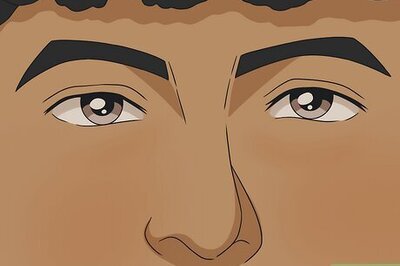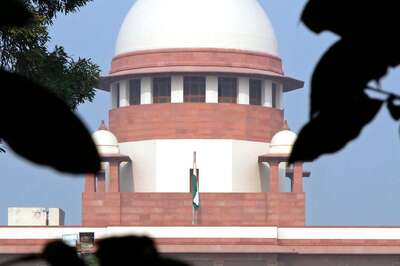
views
Auckland: New Zealand will face France in the Rugby World Cup final after beating arch rivals Australia 20-6 in their semifinal clash on Sunday, drawing a giant step closer to ending a 24-year quest for its second title.
The All Blacks relieved the anxiety of a nation starved of World Cup success since 1987 by physically dominating Australia from the moment Wallabies flyhalf Quade Cooper miscued the opening kickoff, establishing commanding advantages of possession and territory.
"It's awesome," New Zealand captain Richie McCaw said. "We realized that we were going to have to front up and we had do the job for 80 minutes. The intensity was there and every single man did their bit tonight. We've got next week to look forward to."
The New Zealanders achieved a 52 percent share of possession and 64 percent share of territory with ferocious tackling and a firm, physical authority at the breakdown. Armed with those advantages it let loose a backline, managed superbly by rookie flyhalf Aaron Cruden, in which almost every player posed an attacking threat.
When the final whistle blew, a 60,087 crowd made up almost entirely of black-clad New Zealanders let loose a deafening cheer of mixed relief and elation.
The key figures for Australia, the dangerous but erratic flyhalf Cooper, and the openside flanker David Pocock were outplayed by their opposites and swept along in the tide of a game controlled from its outset by New Zealand. Pocock, alone and frequently penalized, couldn't turn back that tide and nor could the Wallabies pack achieve a firm foothold in the match.
"Credit to the All Blacks, they outplayed us and they deserved to win," Wallabies captain James Horwill said.
Cooper was held in check by a defense which allowed him few chances, except under the most suffocating pressure. Similar pressure subdued Wallabies scrumhalf Will Genia.
In contrast, All Blacks flyhalf Aaron Cruden, in only his eighth test and his first in more than a year, played with the composure of a veteran behind a dominant pack. He cleverly marshaled an All Blacks backline in which almost every player represented a clear attacking danger but perhaps the greatest of which were the winger Cory Jane and fullback Israel Dagg.
Dagg created New Zealand's first try for Ma'a Nonu, linking with the center after splitting the Australian defense on a long, angled run in the sixth minute. Weepu kicked two penalties and Cruden a dropped goal as New Zealand took a 14-6 lead to halftime, then added two more penalties for the only points of the second half.
Australia was seen as the greatest obstacle to New Zealand's bid to win the World Cup for the first time since it hosted the inaugural tournament in 1987 and at the end of which it also faced France in the final. France reached the World Cup final for the third time when it beat Wales 9-8 on Saturday.
The All Blacks and Australia agreed the match might hinge on the ability of one side to establish early dominance, then to maintain intense and continuous pressure.
After a tense buildup during which the All Blacks performed the Kapa O Pango haka or challenge, Cooper drifted the kickoff out on the full, immediately putting Australia on the back foot.
Pressure finally told in the sixth minute when Dagg squeezed just inside the touchline and turned an inside pass for Nonu to score.
Weepu missed the conversion and a ninth-minute penalty but he goaled in the 11th, when Pocock infringed at a ruck, and gave the All Blacks an 8-0 lead.
Australia's first venture into New Zealand territory almost brought its first try when the dangerous winger Digby Ioane skewed infield on a strong run, fending Mealamu and carrying Cruden and flanker Jerome Kaino almost to the line. He was finally hurled back but James O'Connor provided Australia's first points from a penalty, cutting the lead to 8-3.
New Zealand continued to dominate, playing at pace and with skill and slick combination. At a controlled breakdown 30 meters from the goalline, Weepu passed to Cruden in the pocket and the young flyhalf slotted a dropped goal which made the led 11-3. Cooper replied with a dropped goal for Australia in the 30th minute.
Weepu added his second goal from five attempts in the 36th minute through an almost comical mixup in the Australian defense. Horwill knocked on a miscued kick from Dagg and fullback Adam Ashley-Cooper, standing 10 meters in front of him, thoughtlessly picked up the bouncing ball.
Weepu extended New Zealand's lead to 17-6 with his third penalty just after halftime and added his fourth and final penalty nine minutes from the end. Australia's lack of discipline told heavily in both halves.
The All Blacks' discipline lapsed for the first time when replacement Sonny Bill Williams was sin-binned in the 76th minute for a shoulder charge on Cooper.
New Zealand has waited a long time to add a second World Cup title, almost quarter of a century punctuated alternately by high hopes and disappointment. After winning a tournament it both conceived and hosted in 1987, it was beaten by Australia in the semifinals in 1991, by South Africa in the final in 1995, by France in the 1999 semifinals, by Australia at the semifinal stage in 2003 and by France in the quarterfinals four years ago.
With each failure, New Zealand fans have grown more impatient and more anxious and the pressure the All Blacks play under at World Cups has grown more intense. After Sunday's win they are one step away from easing that anxiety and pressure. In a piece of historic symmetry, it will face France on the ground on which the long quest began 24 years ago.

















Comments
0 comment